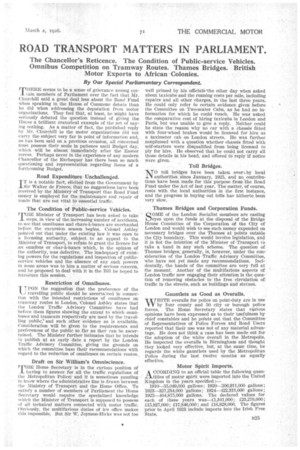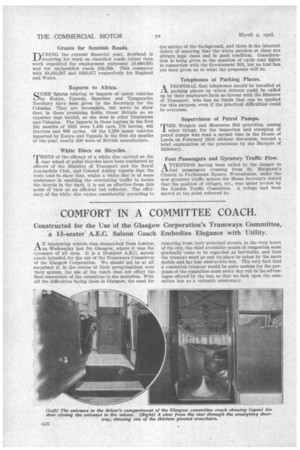ROAD TRANSPORT MATTERS IN PARLIAMENT.
Page 9

Page 10

If you've noticed an error in this article please click here to report it so we can fix it.
The Chancellor's Reticence. The Condition of Public-service Vehicles. Omnibus Competition on Tramway Routes. Thames Bridges. British Motor Exports to African-Colonies.
By Our Special Parliamentary Correspondent.
THERE seems to be a sense of grievance among cerfain members of Parliament over the fact that Mr. Churchill said a great deal less about the Road Fund when speaking in the House of Commons debate than he did when addressing the deputation from motor organizations. They feel that, at least, he might have seriously debated the question instead of giving the House a brilliant oratorical example of the art of saying nothing. As a matter of fact, the published reply by Mr. Churchill to the motor organizations did not carry the subject very far in point of information and, ashas been said on a previous occasion, all concerned must possess their souls in patience until Budget day, which will be almost immediately after the Easter recess. Perhaps never in the experience of any modern Chancellor of the Exchequer has there been so much questioning. and representation regarding items of a forthcoming Budget.
Road Expenditure Unchallenged.
IT is a notable fact, elicited from the Government by Sir Walter de Preece, that no Suggestions have been received by the Ministry ofTransport that Road Fundmoney is employed for the maintenance and repair of roads that are not vital to essential traffic.
The Condition of Public-service Vehicles.
MHE Minister of Transport has been asked to take J. steps, in view of the increasing number of accidents, to see that omnibuses and chars-h-bancs are overhauled before the excursion season begins. Colonel Ashley pointed out that Under the existing law it was open to a licensing authority, subject. to. an appeal to the Minister of Transport, to refuse to grant the licence for an omnibus or cbar-h-bancs which, in the opinion of the authority, was defective. The inadequacy of existing powers for the regulations and inspection of public-. service vehicles and the absence of any such powers. in some areas was to !aim a matter of serious concern, and be proposed to deal with it in the Bill he hoped to introduce this session.
Restriction of Omnibuses.
UPON the suggestion that the preference of the travelling public should be ascertained in 'connection with the intended restrictions of omnibuses on tramway routes in London, Colonel Ashley states that the London' Traffic Advisory Committee have had before them figures showing the extent to which oinniimses and tramcars respectively are used by the travelling public, "'and such other evidence as is available. Consideration will be given to the requirements and preferences of the public so far as they can be a.scertabled. The Minister further intimates that he intends to publish at an early date a report by the London Traffic Advisory Committee, giving the grounds on which the committee -base their recommendations with regard to the reduction of omnibuses on certain routes..
Draft, on Sir William's Omniscience.
THE Home Secretary is in the curious position of having to answer for all the traffic regulations of the Metropolitan Police,and it is sometimes puzzling to know where the administrative line is drawn between the Ministry of Transport and the Home Office. To satisfy a number of members of Parliament the Home Secretary would require the specialized knowledge which the Minister of Transport is supposed to possess of all technical matters connected with motor traffic. Obviously, the multifarious duties of his office makes this impossible. But Sir W. Joynson-Hicks was not too
well primed by his official the other day when asked about taxicabs and the running costs per mile, including repairs and all other charges, in the last three years. He could only refer to certain evidence given before the Committee on Two-seater Cabs, as he had no information for which he could vouch. He was asked the comparative cost of hiring taxicabs in London and Paris, but was unable to give a reply. Neither could he state the reason why no car with a chassis fitted with four-wheel brakes would be licensed for hire as a taximeter cab on London streets. He was further nonplussed with a question whether chassis fitted with self-starters were disqualified from being licensed to ply for hire. He observed that he could not carry all those details in his head, and offered to reply if notice Were given.
Toll Bridges.
NO toll bridges have been taken over, by local authorities, since January, 1025, and no contributions have been made for this purpose from the Road Fund-under the Act of last year. The matter, of course, rests with the local authorities in the first instance, and the progress in buying out tolls has hitherto. been very slow.
Thames Bridges and Corporation Funds.
SOME of the London Socialist members are casting eyes upon the funds at the disposal of the Bridge House Cominittee of the Corporation of the City of London and would wish to see such money expended on necessary bridges over the Thames at points outside the City boundary. This would involve legislation, and it \is not the intention of the Minister of Transport to take a hand in any such scheme. The question of Thames bridges, generally, is, however, under the consideration of the London Traffic Advisory Committee, who have not yet made any recommendations. Incidentally, the hands of the committee are very full at the moment. Another of the multifarious aspects of London traffic now engaging their attention is the question of removing obstacles to the free circulation of traffic in the streets, such as buildings and statues.
Gauntlets as Good as Overalls.
THITE overalls for police on point-duty are in use V V by four county and 50 city or borough police forces. The Home Secretary states that various opinions have been expressed as to their Usefulness by chief constables and he points out that the Committee of Representatives of Police Forces and Road Users reported that their use was not of any material advantage. He does not think a case has been made out for the adoption of the white Overall in the Metropolis. He inspected the overalls in Birmingham and thought they looked very effective, but, at the same time, he regards the white gauntlets used by the Metropolitan Police during the last twelve months as equally effective,
Motor Spirit Imports.
ACCORDING to an official table the following quantities of motor spirit were imported into the United Kingdom in the years specified:—
1910--55,049,000 gallons ; 1920-206,911,000 gallons; 1923-327,234,000 gallons ; 1924-422,311,000 gallons ; 1925-404,875,000 gallons. The declared values for each of these years was—f 1,341,000; £23,276,000; £15,827,000; £17,846,000; and £16,828,000. The figures prior to April 1923 include imports into the Irish Free State.
Grants for Scottish Roads.
TAURING the -current financial year, Scotland is receiving for work on classified roads (other than work expedited for employment purposes) £1,660,095 and for unclassified roads £68,389. This compares with £9,410,267 and £636,677 respectively for England and Wales.
Exports to Africa.
SME figures relating to imports of motor vehicles by Kenya, Uganda, Zanzibar and Tanganyika Territory have been given by the Secretary for the Colonies. They are incomplete, but serve to show that, in these promising fields, Great Britain as an exporter lags behind, as she does in other Dominions and Colonies. The imports in those regions in the first 101months of 1925 were 1,458 cars, 776 lorries, 402 tractors and 868 cycles. Of the 1,200 motor vehicles imported by Kenya and Uganda in the first six months of the year, nearly 200 were of British manufacture.
White Discs on Bicycles.
TESTS of the efficacy of a white disc carried on the rear wheel of pedal bicycles have been conducted by officers of the Ministry of Transport and the Royal Automobile Club, and Colonel Ashley reports that the tests tend to show that, whilst a white disc is of some assistance in enabling the overtaking traffic to locate the bicycle in the dark, it is not so effective from this point of view as an efficient red reflector. The efficiency of the white disc varies considerably according to
the nature of the background, and there is the inherent defect of ensuring that the white patches or discs are always kept clean and in good condition. Consideration is being given to the question of cycle rear lights in connection with the Government Bill, but no hint has yet been given as to what the proposals will be.
Telephones at Parking Places.
A PROPOSAL that telephones should be installed at .1"parking places by which drivers could be called up by their employers finds no favour with the Minister of Transport, who has no funds that can be applied for this purpose, even if the practical difficulties could be overcome.
Supervision of Petrol Pumps.
yr HE Weights and Measures Bill providing, among
-other things, for the inspection and stamping of petrol pumps was read a second time in the House of Lords on February 23rd without discussion, beyond a brief explanation of the provisions by the Marquis of Salisbury.
Foot Passengers and Gyratory Traffic Flow.
ATTENTION having been called to the danger to foot passengers crossing from St. Margaret's Church to Parliament Square, Westminster, under the new gyratory traffic system the Home Secretary stated that the position of refuges, etc., was under review by the London Traffic Committee. A refuge had been moved at the point referred to.




























